National Security Initiative
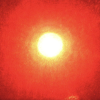 Build a powerful enough laser, and you can shine it into space. Aim it well, and you can blind satellites. In The Conversation, aerospace engineering professor Iain Boyd discusses how the reputed new Russian laser facility called Kalina might work to interfere with satellites orbiting overhead.
Build a powerful enough laser, and you can shine it into space. Aim it well, and you can blind satellites. In The Conversation, aerospace engineering professor Iain Boyd discusses how the reputed new Russian laser facility called Kalina might work to interfere with satellites orbiting overhead.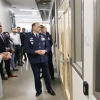 CU Boulder’s prowess in space exploration took center stage during a visit from the newly named “champions” of the USSF University Partnership Program for the CU system: Brig. Gen. John Olson and Col. Marc Brock. The campus tour kicked off the second phase of an ambitious research and education partnership.
CU Boulder’s prowess in space exploration took center stage during a visit from the newly named “champions” of the USSF University Partnership Program for the CU system: Brig. Gen. John Olson and Col. Marc Brock. The campus tour kicked off the second phase of an ambitious research and education partnership.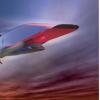 The University of Colorado Boulder has received a five-year, $7.5 million grant to advance the science of hypersonic flight. The grant will investigate plasma that forms around sub-orbital vehicles traveling at hypersonic speeds, which can cause radio communication blackouts and impacts aerothermal heating.
The University of Colorado Boulder has received a five-year, $7.5 million grant to advance the science of hypersonic flight. The grant will investigate plasma that forms around sub-orbital vehicles traveling at hypersonic speeds, which can cause radio communication blackouts and impacts aerothermal heating.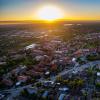 CU Boulder’s high-impact physics research and education—as well as the newly-formed University Consortia for Space Technology—will receive additional funding as part of the recently passed $1.5 trillion federal appropriations omnibus bill for the 2022 fiscal year.
CU Boulder’s high-impact physics research and education—as well as the newly-formed University Consortia for Space Technology—will receive additional funding as part of the recently passed $1.5 trillion federal appropriations omnibus bill for the 2022 fiscal year. Dr. Iain Boyd, director of the Center for National Security Initiatives at CU Boulder, said even small adjustments in hypersonics maneuvering can make a big difference. “You’re not maneuvering so that you’re turning very large angles,” he said. “You’re just doing a little bit. And that’s more than enough to make it difficult to track.”
Dr. Iain Boyd, director of the Center for National Security Initiatives at CU Boulder, said even small adjustments in hypersonics maneuvering can make a big difference. “You’re not maneuvering so that you’re turning very large angles,” he said. “You’re just doing a little bit. And that’s more than enough to make it difficult to track.”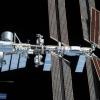 Russia launched a missile and blew up one of its old satellites last week, triggering an alert for the International Space Station and concern that space could become a new battleground. Colorado Public Radio interviews Dr. Iain Boyd, Director of
Russia launched a missile and blew up one of its old satellites last week, triggering an alert for the International Space Station and concern that space could become a new battleground. Colorado Public Radio interviews Dr. Iain Boyd, Director of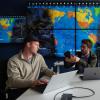 The University of Colorado Boulder has received a $2 million gift from The Anschutz Foundation to support the university’s diverse research in aerospace and national defense—from tracking and protecting satellites in orbit to improving the
The University of Colorado Boulder has received a $2 million gift from The Anschutz Foundation to support the university’s diverse research in aerospace and national defense—from tracking and protecting satellites in orbit to improving the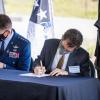 The U.S. Space Force expanded its University Partnership Program at the University of Colorado during a memorandum of understanding signing event Aug. 20. Vice Chief of Space Operations Gen. David D. Thompson joined University of Colorado President
The U.S. Space Force expanded its University Partnership Program at the University of Colorado during a memorandum of understanding signing event Aug. 20. Vice Chief of Space Operations Gen. David D. Thompson joined University of Colorado President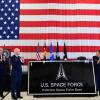 From satellites probing the far reaches of the solar system to television from space, Colorado leads the way. The state is also the home to the bulk of the new Space Force, with four of its bases and its most important missions. Colorado
From satellites probing the far reaches of the solar system to television from space, Colorado leads the way. The state is also the home to the bulk of the new Space Force, with four of its bases and its most important missions. Colorado Check out the latest Buff Innovator Insights Podcast with Dr. Iain Boyd, H.T. Sears Memorial Professor of Aerospace Engineering Sciences and Director of the Center for National Security Initiatives at CU Boulder.We’ll hear about how Dr.
Check out the latest Buff Innovator Insights Podcast with Dr. Iain Boyd, H.T. Sears Memorial Professor of Aerospace Engineering Sciences and Director of the Center for National Security Initiatives at CU Boulder.We’ll hear about how Dr.

